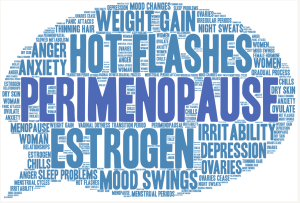I was in my mid-40s, raising my young children, and running my own business when my perimenopause symptoms began. On top of night sweats, I had a belly that wouldn’t budge and was dealing with constant irritability from stress and disrupted sleep.
As a long-time wellness professional, I knew there had to be more to the changes happening in my body and those of my clients. This put me on a path to learn about these midlife shifts and how to manage this phase with patience and understanding.

Perimenopause Symptoms
Perimenopause is the transitional period before a woman reaches menopause. It is often marked by what is frequently termed the “Core Four” symptoms:
1) hot flashes,
2) sleep disturbances,
3) depression, and
4) vaginal dryness.
The end of perimenopause is determined once a woman completes twelve months without a menstrual period. Then, she is officially in menopause.
During this perimenopausal transition, a woman’s estrogen levels rise and fall – sadly, unpredictably. The body has to adjust to these changes. The process of decreased ovarian function and a lowering in estrogen levels can take anywhere from months to several years (that’s right, possibly up to ten years).
It is common for women to experience additional physical and emotional symptoms beyond the “Core Four.”
Women may not relate these additional conditions to perimenopause (like, allergies, really? …and burning mouth, what?). They may blame headaches or allergies on weather changes, ascribe weight gain to those days missed at the gym, or equate brain fog with aging. It’s not unusual for this list of accompanying symptoms to show up during this phase of life.

What Causes Perimenopause Symptoms?
These symptoms can all be attributed to the same thing – fluctuating hormones. Recognizing the root cause of these changes can not only help make sense of what is happening, but can also empower you to manage them in a positive way.
1) Headaches
Uneven levels of progesterone and estrogen can affect levels of the neurotransmitter serotonin and nerve function in the brain, triggering headaches and migraines. Sleep disturbances can also lead to increased headaches.
2) Heart palpitations
A decrease in estrogen levels can cause the heart to be overstimulated creating a fluttering or racing heart.
3) Difficulty concentrating
It’s not just hormonal changes, but the lack of sleep and stress that contribute to brain fog during perimenopause.
4) Memory lapses
The decline of estradiol, a type of estrogen found in the brain, can affect how brain cells interact and regenerate, leading to decreased cognitive function.
5) Fatigue
Sleep disturbances, stress, brain fog, and hormonal changes can all lead to perimenopause fatigue.
6) Mood changes
Considering all the sleep disturbances, anxiety, fatigue, headaches, intestinal upset, bloating, muscle pain, hot flashes, cold flashes (yes, that’s a thing), and weight gain, it’s no wonder women might feel a bit moody during perimenopause 🤣.
7) Irritability
With a review of this list, it’s easy to see why irritability is a common perimenopause symptom. Lack of sleep and fatigue are definite contributors.
8) Anxiety
With unstable hormonal fluctuations and the accompanying stress, insomnia, and unpredictability that often occur during perimenopause, women may experience persistent anxiety. It is important to seek help from a health professional if anxiety or depression symptoms become overwhelming or unmanageable.
9) Dizziness
Researchers have not found a direct cause of dizziness during perimenopause, but conclude that other symptoms like lack of sleep, headaches, and anxiety, contribute to the feeling of lightheadedness.
10) Allergies
Our immunoregulatory cells have estrogen receptors. It is believed that changes in hormonal levels can affect our body’s immunity and inflammatory responses to various triggers, including seasonal, skin, and food allergies as well as asthma.
11) Joint and muscle pain
As with our immune cells, our joint and muscle tissue also carry estrogen receptors. When estrogen decreases, so does the ability of our joints and muscles to regenerate effectively.
12) Tingling in extremities
The onset of paresthesia—or a pins and needles feeling in the limbs, hands, or feet—is also affected by a decline in estrogen. This hormonal decline can disrupt messages sent by the central nervous system to other areas of the body.
13) Tinnitus
The drop in hormone levels can affect the blood flow to the inner ear, causing hearing difficulties and tinnitus. The estrogen decline can also exacerbate already existing hearing issues.
14) Dry, itchy skin
Fluctuating estrogen levels can affect collagen production and our skin’s ability to stay hydrated, leading to dryness and a loss of skin suppleness.
15) Thinning hair
As estrogen levels decrease, the concentration levels of androgens (male hormones) increase, which can contribute to hair loss by causing the hair follicles to shrink. Some good news, often the hair loss isn’t permanent.
16) Changes in body odor
With night sweats and hot flashes becoming frequent occurrences during perimenopause, bacterial growth and body odor also increase. Changes in hormonal production, like increased testosterone and cortisol, can also add to a strong odor.
17) Brittle nails
As mentioned previously, fluctuating estrogen levels can cause hair, skin, and nails to lose their hydration.
18) Weight gain
Metabolic shifts from a decrease in estrogen and progesterone may cause weight gain in some women, particularly around the belly.
19) Digestive problems
Decreased levels of estrogen and progesterone may disrupt gallbladder functioning and motility of the bowels. This can result in gastrointestinal problems like constipation or agitate existing illnesses such as irritable bowel syndrome or inflammatory bowel disease.
20) Bloating
If gastrointestinal disturbances weren’t enough, hormonal changes can also cause abdominal pain and bloating. Increased cortisol levels from stress can also affect GI tract functioning, causing gas and bloating.
21) Breast discomfort
As hormones fluctuate during perimenopause, so does breast tenderness. Additionally, the reduction of estrogen causes milk production systems to stop functioning and shrink in size, lessening breast fullness.
22) Changes in taste and smell
Estrogen is linked to saliva production. Declining estrogen means reduced levels of saliva, which is essential to taste perception. Since taste and smell are linked, these hormonal changes can alter olfactory senses as well.
23) Burning mouth syndrome (BMS)
Changes in saliva production can also create BMS, or burning mouth syndrome, where the lips, tongue, and roof of the mouth experience pain or burning. This can be caused by hormonal shifts or dryness of the mouth.
24) Dry mouth
The domino effect of reduced saliva can create dry mouth and contribute to conditions like the aforementioned BMS. Reduced saliva can also upset the natural protection against infection and a healthy balance of bacteria in the mouth.
25) Changing cholesterol levels
Hormonal shifts can increase LDL (low-density lipoprotein), or “unfavorable” cholesterol, and decrease HDL (high-density lipoprotein), or the “good” cholesterol.
26) Bone loss and osteoporosis
Estrogen slows the breakdown of bone, so its decrease during perimenopause can escalate bone loss.
27) Frequent urination
The decrease in hormone levels during perimenopause can weaken the pelvic floor muscles, creating the feeling of needing to urinate more often.
28) Increased bleeding during periods
The changes in the level of hormones, particularly progesterone, can generate a buildup of the uterine lining and subsequent heavy bleeding once it is shed. Furthermore, endometriosis and fibroids can become more problematic as estrogen levels fluctuate.
29) Lowered libido
With hormonal changes, vaginal dryness, exhaustion, and irritability, interest in sexual activity understandably wains during perimenopause.
30) Cold flashes
On top of hot flashes, women can also experience bouts of the chills due to changes in hormone levels (not fair, I know)

Recognizing these perimenopause symptoms can be important to your overall health and taking control of your midlife wellness. If you’re ready to optimize your health, feel more energetic, and feel more confident in your body, join my Small Group Concierge Wellness program or check out my online course MASTER Menopause NOW! to embrace this stage of your life and forge a positive path forward.



